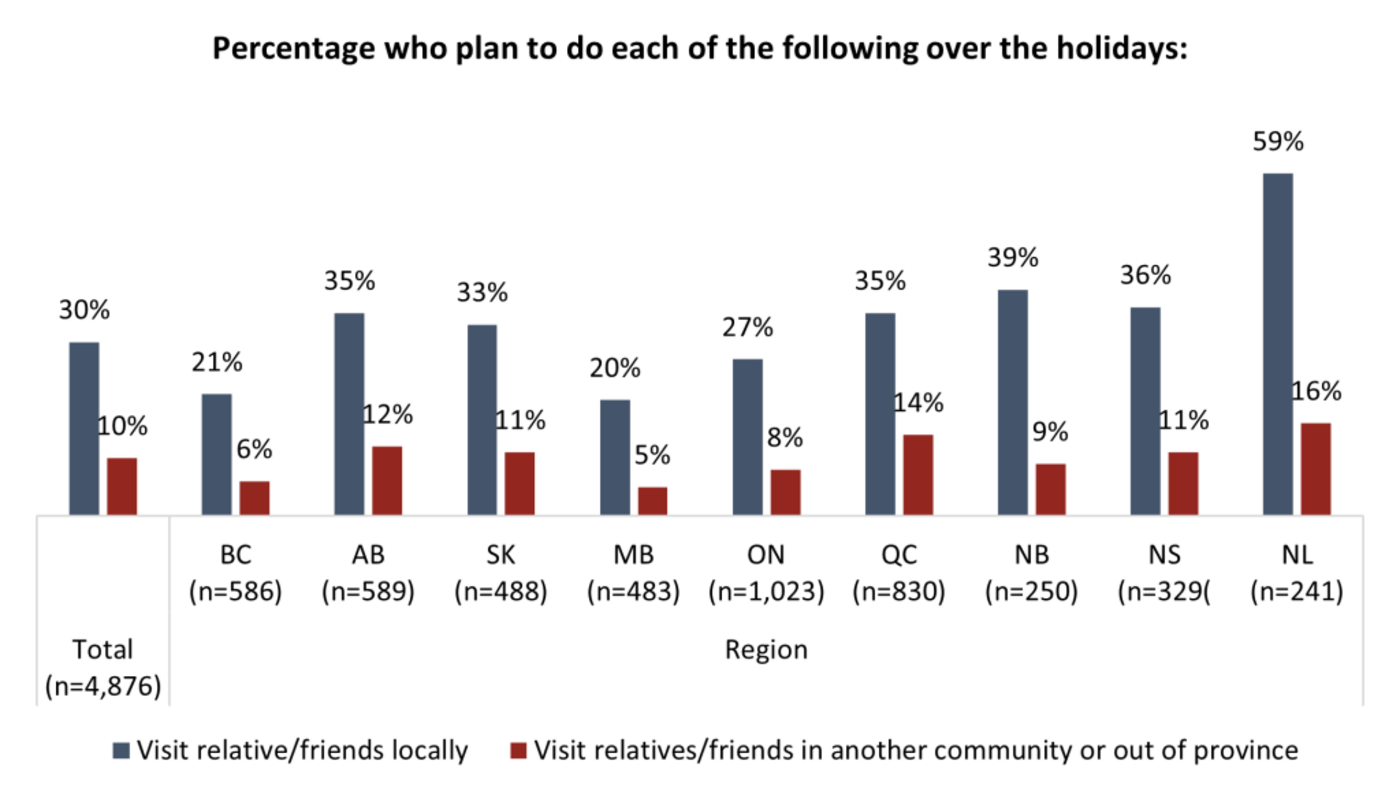
The people of Toronto are now more than two weeks into a month-long lockdown period implemented by the provincial government to slow the spread of COVID-19, and yet, rates of the deadly viral illness continue to rise.
Ontario's Ministry of Health reported a record high 1,925 new cases of the coronavirus on Monday, 601 of them in Toronto, with 213 patients now in hospital ICU wards.
With the holiday season approaching fast, officials are growing nervous about the potential for superspreader events to emerge — and justifiably so.
The results of a new Angus Reid poll show that 27 per cent of Ontario residents plan to visit friends or family members locally for Christmas, while 8 per cent say they'll be travelling to visit relatives in other communities.
Some 10 per cent of all Canadian respondents said that they would be travelling for Christmas this year, contrasted against 51 per cent of people in 2019.

The results of a new Angus Reid survey about the upcoming COVID-19 Christmas period show that many people in Ontario still intend on travelling for the holidays, despite the advice of public health officials. Image via Angus Reid.
While fewer people will be out and about this holiday season due to the pandemic, public health officials are united across the board in saying that everybody should stay home unless it's absolutely essential for them to leave.
"We are now less than 20 days from Christmas day and a week into a month traditionally filled with celebrations and observances in many faiths and cultures," said Toronto Medical Officer of Health Dr. Eileen de Villa on Monday.
"This year cannot be as usual."
Dr. de Villa pointed out that Toronto had recorded 4,100 new cases of COVID-19 and 68 deaths in the first seven days of December alone.
"The case counts are so high that I can only call this a very, very serious situation. There is no way to argue otherwise," she said during a press conference at city hall. "COVID-19 is spreading aggressively in Toronto."
December is 7 days along & we've already reported over 4,100 new #COVID19 cases & 68 deaths. We can still control what happens next if we make the choices this very serious moment demands, especially by joining together in staying apart during holidays: https://t.co/wqXLdkdF8W
— Dr. Eileen de Villa (@epdevilla) December 7, 2020
"In our own lives, risky in-home festivities will easily make things worse and already I'm as worried now about what may happen in January as I am about the rest of this month," said de Villa of what the holiday season could bring.
"Contact between people, especially from December 24th to New Year's Day, could easily amplify the number of infections we are seeing right now."
And higher numbers will equate to an even longer, perhaps harsher lockdown — something nobody wants to see happen.
The provincial government is recommending that people restrict in-person holiday celebrations to include members of their own household only, and to celebrate virtually with anyone else. People who live alone may consider "exclusively celebrating with one additional household."
Individuals from higher transmission regions should avoid travel to lower transmission regions except for essential reasons (read: residents of lockdown zones like Toronto and Peel shouldn't visit anyone in red, orange, yellow or green zones.)
Every time a patient tells me they have holiday travel plans, I cringe. This is NOT a safe December, #Ontario.
— Dr Nili Kaplan-Myrth, MD, PhD, CCFP (@nilikm) December 7, 2020
Could have been avoided. If the province won’t shut down, we’re ALL at risk of #COVID19#StayHome
Any other family docs planning to switch to phone only in January? https://t.co/3cKoYQWBOm
University and college students heading home for Christmas are asked to "consider doing a self-quarantine, or reducing close contact with others, 10 to 14 days before returning home for the holidays."
"After this long year, everyone is vulnerable to the need to relax and forget," said de Villa during Monday's press conference.
"So if your holidays usually involve lots of time with friends and family, please start thinking now about the change you will make for your own safety and commit to those changes."
"Making the best of a very different holiday season, like so much this year, demands that we do things differently. Human nature being what it is, this isn't an easy commitment to make and it's going to take some time to get used to," the doctor and public health expert acknowledged.
"By joining together in staying apart, we will deliver a safer holiday in 2020 that positions us for the holidays and the everyday lives we want in 2021."






0 comments:
Post a Comment